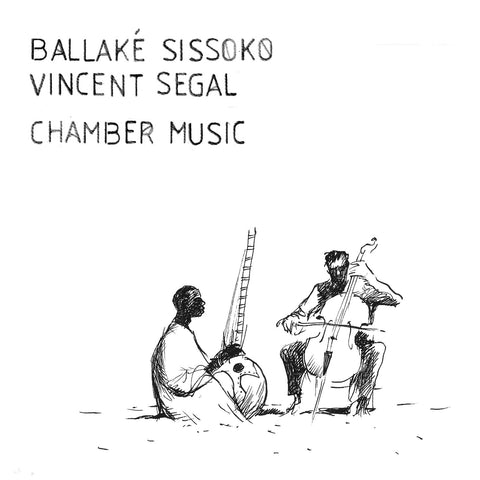Recorded by Fabien Girard at studio Moffou, Bamako in 2009
Mixed by Philippe Teissier du Cros, studio Boxson, Paris, in2009
Mastered by Raphaël Jonin au studio JRaph ing
Executive Production - Laurent Bizot assisted by Thibaut Mullings
Guests
Awa Sangho - Lead vocal on Regret - à Kader Barry
Mahamadou Kamissoko - Ngoni on Houdesti
Fassery Diabate - Balafon on Houdesti
Demba Camara - Bolon on Oscarine, Halinkata Djoubé, Mako Mady
Karignan on "Ma-Ma" FC, Regret - à Kader Barry
All songs published by Nø Førmat! except Oscarine, Histoire de Molly, and "Ma-Ma" FC
For any musician, playing in a duo represents a singular experience. Because it pursues the ideal of a tête-à-tête in which the protagonists melt their voices in the crucible of a common thought, it places sharing at the very origin of the instrumental gesture more than ever. It requires not only a very high quality of speech, but also an exceptional quality of listening. In duets, it is also and above all with the ears - the musician's first real instrument - that everything is played out.
This art of conversation, based on understanding and attention to the other, is pushed to its highest degree of accuracy by kora player Ballaké Sissoko and cellist Vincent Segal on Chamber Music. This album could only have been the testimony of a brief meeting placed under the sign of the crossbreeding of cultures. Fortunately, it is much more than that. Formerly residents of the same label (Label Bleu), the two men first took the time to forge close ties of friendship.
The idea of working on a joint album was born a few years ago in the mind of Ballaké Sissoko who, at the Amiens jazz festival, had just attended a concert by Vincent Segal with Bumcello, his explosive duo with Cyril Atef. But for both of them, there was no question of rushing things. "It was important to get to know each other musically," says the Malian musician. "For a long time, we met at Vincent's house every time I was in Paris, and we also gave a few concerts. We built up our complicity little by little. Today, when we play, we understand each other without even speaking: a simple glance is enough. Our hearts are together."
Sissoko and Segal have been cultivating this care for the human texture of all music for over twenty years - the former having crossed his strings with those of Taj Mahal or pianist Ludovic Einaudi, the latter having taken on the roles of accompanist, arranger or producer with a myriad of personalities as different as Cesaria Evora, -M-, Blackalicious, Piers Faccini, Sting or Marianne Faithfull. Their respective careers show the importance they attach transmitting thoughts and feelings.
Coming from multi-secular musical backgrounds (the Mandingo griotic tradition for Sissoko, the classical school for Segal), they could have locked themselves into set patterns of playing and life. From the historical weight of their instrument and their culture of origin, they made a baggage, which they took with them to quench their thirst for knowledge. When Sissoko and Segal decided to record an album in Bamako in May 2009, it was to apply once again the principles of a simple and luminous common ethic, the content of which the Frenchman grasps in a few words: "You just go and look for the pleasure of the music where you can."
The pleasure of music, here, was condensed in the space and time that the two friends arranged for themselves: a bare room in Salif Keita's Moffou studio, three recording sessions without overdubs, woven into the protective cocoon of the Malian night. Away from the hustle and bustle of mankind and in the peaceful heart of the world, Ballaké Sissoko and Vincent Segal have banished from their minds everything that can keep a musician from his art - all those vain considerations of genre or style that are of little interest to those who stick labels on them - in order to better concentrate on the essential: the harmonious interweaving of their languages and signatures, the interweaving of their inner songs, to which the subtle waves of improvisation and the secret vibration of silence have added density. Their complicity is such that the kora and the cello, far from indulging in an overly formal exchange of repartee, seem to express themselves with the same voice: Sissoko and Segal mix their blood and their sounds here to conclude a pact that aims at the gushing out of a word that is precisely united, of incomparable clarity. What we hear in Chamber Music is rare and precious: two sensibilities in unison, on the same wavelength, create a music that literally flows.
The same sense of harmony and fluidity pervades the interventions of the few friends to whom Sissoko and Segal have opened their doors. The voice of the singer Awa Sangho covers with a veil of solemnity the piece Regret, composed as a tribute to the singer Kader Barry. On Houdesti, a long track towards which all the quiet forces running through the album seem to converge, Mahamadou Kamissoko (ngoni) and Fassery Diabaté (balafon), fleeting but pregnant presences, complete the lifting of a music torn from the trends and fashions. On two tracks, Demba Camara makes the crackling sound of the karignan resonate with the science of a master of fire. The whole thing is imbued with an innate gentleness, a gentleness that favours rather than detracts from the greatest intensity of expression. In recording this album, Vincent Segal says he thought of musicians such as the English songwriter Nick Drake or the pianist Annette Peacock, authors of epures with the inscription force of etchings. The vibrant paintings of Chamber Music naturally validate his visions: stripped of all superfluous material, they reach the primary and moving truth of the music without detours.


